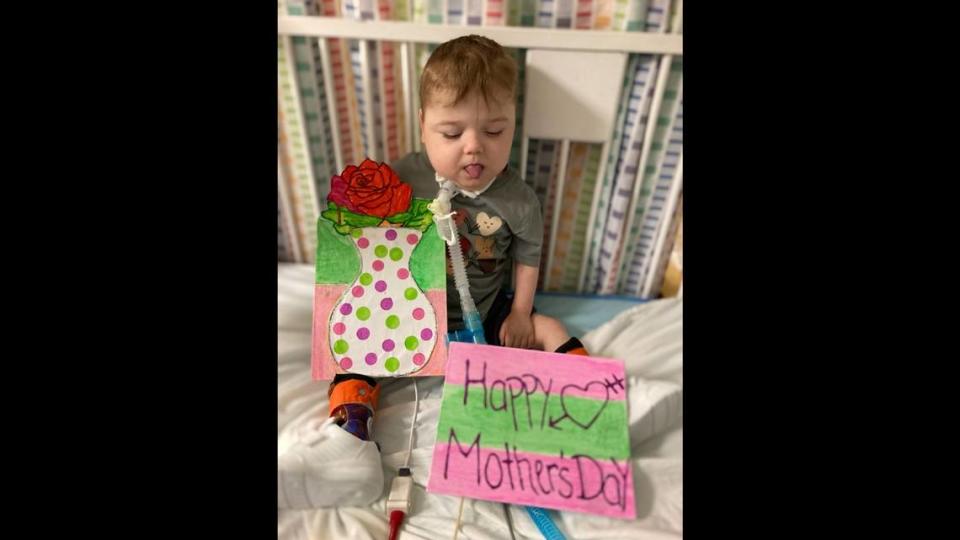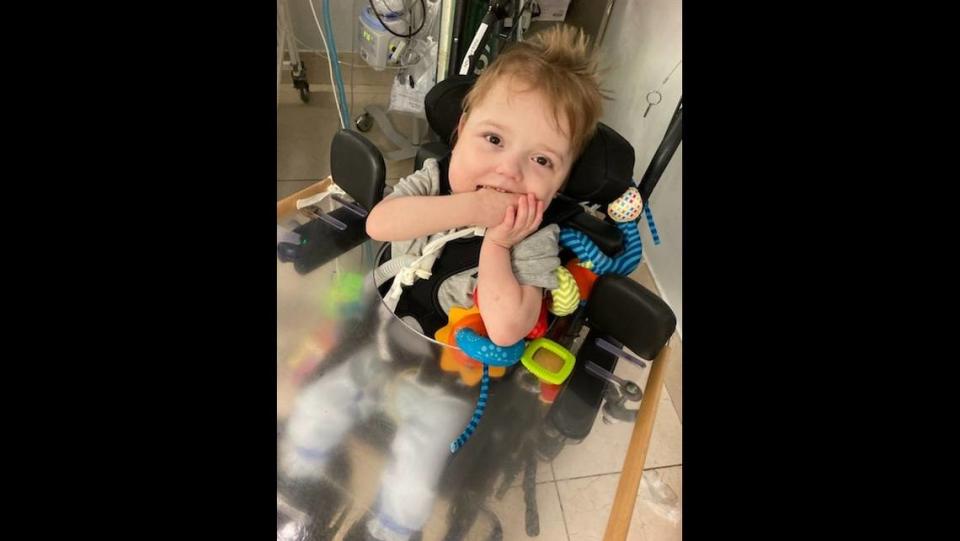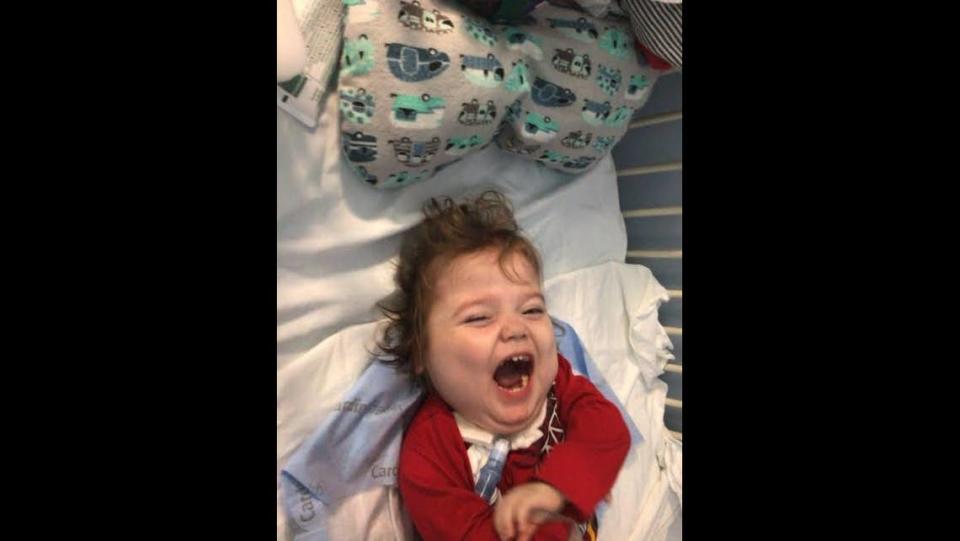‘They don’t care what’s best for my child. I care’: Mom fights Florida over fragile son
- Oops!Something went wrong.Please try again later.
From the time he was born 2,082 days ago, Braydenn Powell has never lived a moment outside a hospital or institution. His parents, who live near Dallas, desperately want to take him home. Florida health administrators are paying roughly $250,000 yearly for his care at a nursing home, where he is likely to remain for the rest of his childhood, if not the rest of his life.
A medical airlift, at a fraction of that cost, would reunite the medically fragile 5-year-old with his family, and shift the burden of his care from Florida to Texas. But the Florida Agency for Health Care Administration won’t pay for that.
“Florida won’t give me my child, unless I can pay for it,” said Braydenn’s mother, Brittany Hayes. “They say it is not medically necessary for him to be here.”

“How in the world is it not medically necessary for my son to be with his family?”
With his strawberry blond hair and perpetual smile, Braydenn Powell appears in family photos almost like any other kid his age. Only the ventilator tubing hints at his severe disabilities.
Just 37 pounds and not quite three feet tall, Braydenn could be the poster child for a tragedy that, in its scope, is virtually unique to Florida: the housing of severely medically complex youngsters, some of them newborns and infants, in nursing homes, mostly designed for frail elders.
READ MORE: Parents, feds fight for kids in Florida nursing homes
But Braydenn is no one’s symbol. Few people outside state government are even aware that 140 frail and disabled children live in institutions. Florida health regulators won’t talk about it. They’ve spent millions — administrators refuse to say exactly how many — fighting a federal civil rights lawsuit intended to put a stop to the practice.
The lawsuit, filed a decade ago by the U.S. Justice Department, is scheduled for trial Monday, May 8.
Braydenn and his twin sister, Braylynn, were born on Aug. 24, 2017, at St. Mary’s Hospital in West Palm Beach when their mother unexpectedly went into labor at only 24 weeks gestation. Both children experienced significant challenges; only Braydenn has struggled mightily to overcome them.
The list of Braydenn’s diagnoses reads like chapters from a medical book. He suffers from pulmonary hypertension, a type of high blood pressure, and respiratory failure, chronic anemia and lung disease, is dependent on a respirator and a feeding tube, has a shunt in his head to drain fluid and has developed so far only to the level of an infant, according to records and interviews.
A few months after the twins’ birth, their father, Brandon Powell, was laid off from his job as a window and door installer, Hayes said. Following Braylynn’s discharge from the hospital at six months, Hayes and Powell moved to Denton, a suburb of Dallas, where they could live with Hayes’ mother until they got back on their feet.
READ MORE: Founder of nursing home for kids doesn’t want kids there permanently
“We lost our house. We were homeless,” said Hayes, 31. “We had a brand new baby. We went to the hospital and bawled our eyes out. My mom was the only reason why we had a place to live. She picked us up and basically gave us her house.”
“Leaving Florida was the hardest thing I ever had to do in my life,” Hayes said.
The plan, Hayes said, always was to retrieve Braydenn as soon as the couple was able. But days turned to weeks, and weeks into months. The twins got a baby brother, Colton, a year later, and then another brother, Collin, on March 30 of this year.
Hayes and Powell knew their family would never be whole without Braydenn. But every time the couple asked, Florida’s Medicaid managed care program, which insures the boy, had a reason why their son couldn’t leave Children’s Comprehensive Care Center, a 36-bed Pompano Beach nursing home for fragile children, Hayes said.
Records from the managed care plan, called Sunshine Health, and other documents shared with the Herald confirm that Hayes has sought for years to have her son reunited with his family:

Dec. 11, 2019, Children’s Medical Services report: “Braydenn’s mother wishes for him to be transferred to a skilled nursing facility in Texas, to be closer to family, but there are no concrete plans in place at this time.”
Dec. 14, 2020, Notation in Medicaid insurance file: “Mother would like [Braydenn] to be transferred to Texas where she resides.”
Sept. 7, 2021, Notation in Medicaid insurance file: “Per mom, she has been trying to transfer [Braydenn] to Texas where she currently lives.”
Oct. 15, 2021, Letter from Children’s Medical Services: “The request for transfer to Children’s Medical Center in Dallas, Texas for initial hospital care is denied because we have not been provided with any supporting clinical documentation [notes] that establishes the medical need for [Braydenn’s] transfer out of state…It has not been shown that [Braydenn’s] care needs… cannot be met by a facility/provider within the State of Florida.”
Oct. 21, 2021, Notation in Medicaid insurance file: “Mom states she was told by Joe DiMaggio Children’s Hospital social worker to become more vocal with insurance in regards to [Braydenn] being transferred to a Texas hospital. Per Mom, Texas is waiting for Sunshine to agree to pay for his stay in Texas until Texas Medicaid kicks in.”
Oct. 22, 2021, Notation in Medicaid insurance file: “Mother stated that she has never been able to get [Braydenn] to Texas…Parent stated she doesn’t understand why the transfer would be denied. Stated that she believes his treatment cost is much greater than the cost to transfer him to Texas.”
Oct. 22, 2021, Notation in Medicaid insurance file: “[Braydenn] is currently hospitalized, and parent would like the member to be transferred from the hospital in Florida to a hospital in Texas. Mother stated that she has never been able to get [him] to Texas.”
Nov. 4, 2021, Notation in Medicaid insurance file: “Mom upset that she cannot get child transferred to Texas and states if she has to she will go to media outlets stating we are holding her child hostage.”
Nov. 22, 2021, Notation in Medicaid insurance file: “There is no plan to transfer to Texas at this time due to no funding.”
Even after Braydenn was diagnosed with liver cancer in the fall of 2021, and Hayes asked the state to transfer him so she could be there for his surgery and recovery, Florida health regulators refused, records show. From Oct. 6, 2021: “Due to [Braydenn] being diagnosed with liver cancer, family would like [him] close by.”
As recently as March of this year, an attorney for Braydenn’s Medicaid managed care provider denied a request from a disability rights lawyer, Liam McGivern, that Braydenn be airlifted to Texas.
“Florida Medicaid does not cover transportation to another state for the convenience of a recipient wanting to be closer to family, which is what you have described here,” wrote attorney Craig H. Smith, in a March 27 email.
The email outrages Braydenn’s mom: “Convenience of the family? What about the convenience of Braydenn?” she said. “He doesn’t even know his family. He knows me, because I talk to him on Facetime, and I’m able to go down to Florida to spend time with him. He met Colton and Braylynn one time his entire life. One time.
“I’m sure Braydenn wants to be with his family. They don’t care about what’s best for my child. I care about what’s best for my child.”
Marjorie Evans, the nursing home’s CEO, acknowledged in an interview with the Herald that Braydenn remains there “because that was where the money was. There’s no way out for these kids the way the state has set up [their] care.”

At 5, Braydenn has slipped further and further behind his twin sister, and most children in his age group, Hayes said. He cannot walk or crawl. He doesn’t speak. He is functioning cognitively at the level of an 8-month-old, more or less, she said.
Hayes said she understands that her son would struggle with physical and intellectual development no matter where he lives, and her expectations for him are realistic. But she also believes that he would be healthier and happier living with his family — not in a facility among strangers who are paid to take care of him.
“I know he has disabilities. I’m not expecting too much for my son,” Hayes said. But, she added: “If they’d just give me my child, I would make sure he meets his goals.”
Like many parents of children with complex medical needs, Hayes said, as a result of training and experience, she is as qualified to care for her son as any nurse. She’s comfortable with his feeding tube. She knows how to suction his trach. She offered, she said, to transport Braydenn herself, with the help of family members and friends. The state said no.
But Hayes scoffs at the idea that she could ever cover the cost of a medical flight, even with the help of doctors at Hollywood’s Joe DiMaggio Children’s Hospital. She said they offered to ride on the plane at no charge.
It’s a classic Catch 22, Hayes said: She cannot afford a medical flight. And the state won’t approve any other options. “I don’t want my son to be in bed the rest of his life,” she said.
“How in the world is it okay to treat people’s babies like that,” Hayes said.

